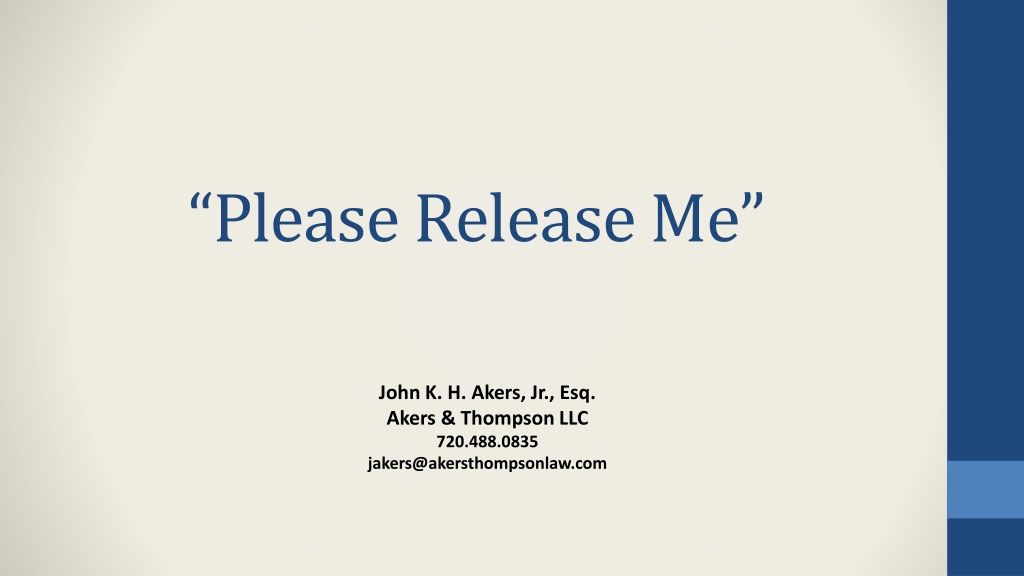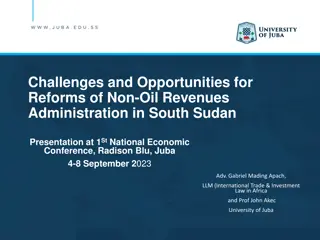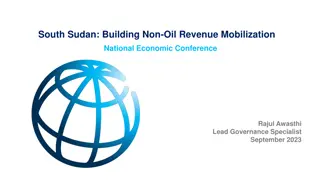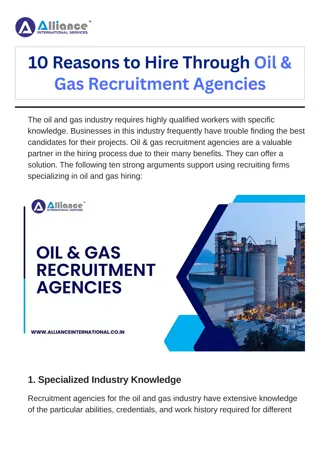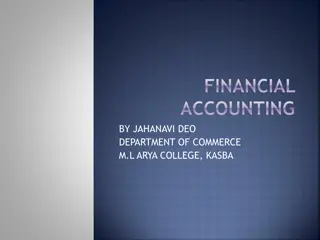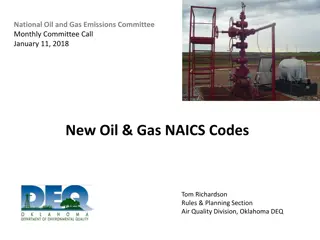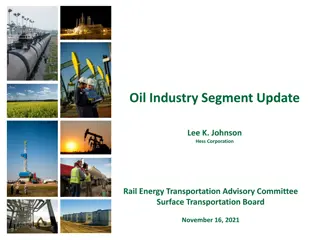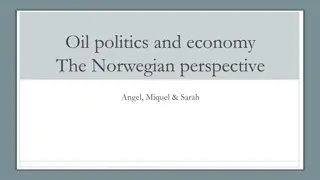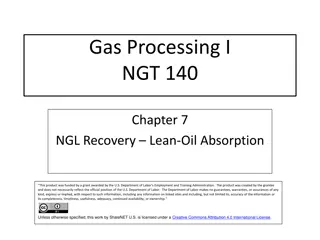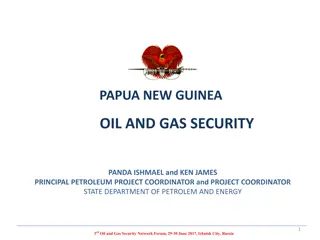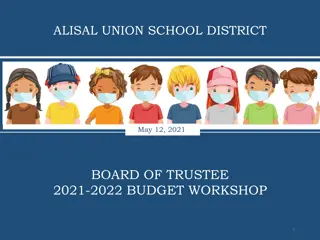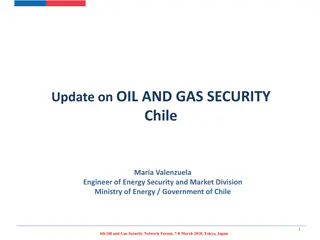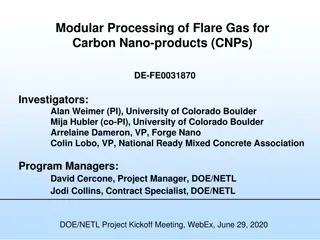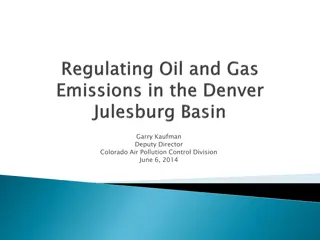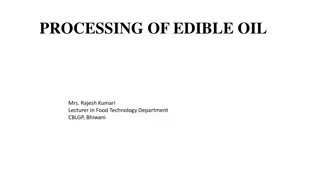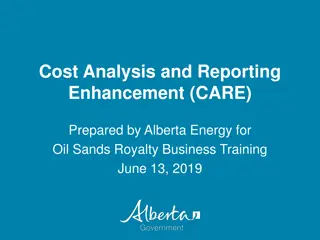Understanding Colorado Oil and Gas Revenue Suspense and Royalty Payments
Explore key insights into the management of oil and gas revenue suspense and royalty payments in Colorado, including legal perspectives on escheatment, ownership titles, royalty payment regulations, and fiduciary duties. Gain clarity on issues such as holding funds due to probate, the suspension of royalty payments, and the importance of clear title ownership.
Download Presentation

Please find below an Image/Link to download the presentation.
The content on the website is provided AS IS for your information and personal use only. It may not be sold, licensed, or shared on other websites without obtaining consent from the author. Download presentation by click this link. If you encounter any issues during the download, it is possible that the publisher has removed the file from their server.
E N D
Presentation Transcript
Please Release Me John K. H. Akers, Jr., Esq. Akers & Thompson LLC 720.488.0835 jakers@akersthompsonlaw.com
My Presumptions 1. Most of the funds held in suspense by oil and gas operators do not qualify as abandoned , and should not escheat under CRS 38-13-101 et seq. (the Colorado Unclaimed Property Act) . 2. Most operators agree that there is no business advantage to be gained by holding oil and gas revenues of third parties in suspense. 3. A large percentage, if not the majority, of oil and gas revenues held in suspense are not being distributed because of outstanding probate issues.
Right to Suspend Royalty Payments Expressly Stated in Oil and Gas Lease Form NOT!
Colorado Royalty Payment Act CRS 34-60-118.5. Payment of proceeds definitions (2) (a) . . . [P]ayments of proceeds derived from the sale of oil, gas, or associated products shall be paid by a payer to a payee commencing not later than six months after the end of the month in which production is first sold. Thereafter, such payments shall be made on a monthly basis not later than sixty days for oil and ninety days for gas. . . (3) (a) Compliance . . . shall be suspended [for] any of the following reasons: (I) A failure or delay by the payee to confirm in writing the payee's fractional interest in the proceeds after a reasonable request in writing by the payer for such confirmation; (II) A reasonable doubt by the payer as to the payee's identity, whereabouts, or clear title to an interest in proceeds; or (III) Litigation . . . entitled. (b) Any delay in determining whether or not a payee is entitled to an interest in proceeds shall not affect payments to all other payees so (4) If a payer does not make [timely] payment . . ., the payer shall pay such payee simple interest on the amount of the proceeds withheld, which interest shall be calculated from the date of each sale at a rate equal to two times the discount rate at the federal reserve bank of Kansas City as such rate existed on the first day of the calendar year or years in which proceeds were withheld.
Definitions Clear Title Unencumbered or unrestricted legal ownership that is free from doubt as to its validity Marketable Title, a.k.a. Defensible Title The term marketable title when applied to real estate, means a title free from reasonable doubt. . . It means a title that is reasonably free from such doubts as will affect the market value of the estate; one which a reasonably prudent person with knowledge of all the facts and their legal bearing would be willing to accept. Morley v. Gieseker, 351 P.2d 392, 393 (Colo. 1960)
The Fiduciary Duty A fiduciary [operator] must act in the best interests of the beneficiary [revenue owner] at all times and can never take any intentional action which harms the beneficiary. In some cases, it requires the fiduciary to make proactive investigation to determine what is in the best interests of the beneficiary and act accordingly. See Stimmel, Stimmel & Smith, The Fiduciary Duty: What Is It and What Does It Impose Upon You? www.stimmel-law.com/index.php/en/articles/fiduciary-duty-what-it-and-what-does-it-impose-upon-you
The Fictional Suspense Account Generally, oil and gas operators do not maintain separate and distinct bank accounts to hold funds being held in suspense. A payor s suspense account is usually nothing more than an accounting entry. It is common, and legal in Colorado, for an operator to store suspensed revenues attributable to third parties in their operating account.
Colorado Cases on Fiduciary Duty Atlantic Richfield Co. v. Farm Credit Bank of Wichita, 226 F.3d 1138 (10th Cir. 2000) Prior decisions from Colorado . . . strongly suggest that a Lessor Lessee relationship . . . does not automatically create fiduciary responsibilities. See Degenhart v. Gold King Petroleum Corp. 851 P.2d 304 (Colo. Ct. App. 1993) However, that a fiduciary duty does not necessarily arise from a lessor lessee relationship does not mean a fiduciary duty never arises from such a relationship. The existence of any fiduciary obligations turns on proof of circumstances. [The Colorado cases] demonstrate that the existence of a fiduciary or confidential relationship is generally a question of fact for the jury. See also: Paine, Webber, Jackson & Curtis, Inc. v. Adams, 718 P.2d 508, 517-18 (Colo. 1986) (Stockbroker/Customer relationship) Dolton v. Capitol Fed. Sav. and Loan Ass'n, 642 P.2d 21, 23 (Colo. Ct. App. 1981) (Borrower and Lender) First Nat'l Bank of Meeker v. Theos, 794 P.2d 1055 (Colo.App.1990) (Trustee relationship)
What Am I Afraid Of? Bad behavior by oil and gas operators leads to punitive legislation. See CRS 38-30-118.5 Gerrity Oil & Gas Corp. v. Magness, 946 P.2d 913 (1997) The Colorado Reasonable Accommodation Act C.R.S. 34-60- 127
The Payment of Proceeds Act Does Not Preclude Other Remedies By its terms, 34-60-118.5 only governs enforcement proceedings before the Commission and is inapplicable to claims for breach of contract. Grynberg v. CO Oil & Gas Comm'n, 7 P.3d 1060 (Colo. App. 1999); See also Atlantic Richfield Co. v. Farm Credit Bank of Wichita, 226 F.3d 1138 (10th Cir. 2000) In Texas, an Operator was found guilty of criminal charges arising from the Operator s misappropriation of royalty owners suspensed revenues to pay vendors and other operating expenses instead. See Coleman v. State, 131 S.W.3d 303 (Tex. App. 2004)
A Last Will and Testament, But No Probate C.R.S. 15-12-901 provides that if a Colorado resident dies testate(i.e. leaving behind a valid last will and testament, the legal title, but not the marketable title, to the property devised under the will passes to the designated devisee. However, until the will is admitted to probate by a Colorado district court, and fully administered under Colorado law, the designated devisee s interest is subject to future claims regarding the validity of the will and claims against the estate of the decedent including the claims of creditors, statutory elections of the surviving spouse, family allowances and exempt property claims. See C.R.S. 15-12-101. C.R.S. 15-12-1006 provides that when a will has been admitted to probate in the State of Colorado but administration of the estate has not been completed, the deviseesunder the will are nevertheless entitled to the decedent s property in accordance with the terms of the will, although their interest remains subject to all valid claims against the estate, including the claims of creditors and statutory allowances for surviving spouse and dependent children. However, in the absence of fraud, and if no claim or demand against the estate is brought within the three year period following the date of the decedent s death, the devisees will acquire merchantable title to the property devised to them under the will.
Colorado Limitations on Probate of LWT (?) CRS 15-12-108 (2016) (1) No informal probate or appointment proceeding or formal testacy or appointment proceeding, other than a proceeding to probate a will previously probated at the testator's domicile and appointment proceedings relating to an estate in which there has been a prior appointment, may be commenced more than three years after the decedent's death . . . (2) These limitations do not apply to: (a) Proceedings to construe probated wills; or (b) Proceedings to determine heirs of an intestate and related appointment proceedings; or (c) Appointment proceedings and testacy proceedings if no previous testacy proceedings or proceedings determining heirship relating to the decedent's estate have been concluded in this state.
CRS 15-12-108(2)(c) Applies By amending the statute through the addition of C.R.S. 15-12-108(2)(c), . . . the [Colorado] General Assembly intended to remove the three-year time bar for commencing a formal testacy proceeding if no previous testacy proceedings have been concluded in this state. See: Order on Petitioner s Motion for Determination of a Question of Law filed In the Matter of the Determination of Heirs or Devisees or Both and of Interest in Property of Clyde Cottrell, Deceased, et al., Case No. 2014 PR 30424, District Court, Weld County , Colorado, citing Chief Judge Hartmann s conclusion in In the Matter of Towanda Grace Woodward, No. 2014PR30028, District Court (Probate), Weld County , Colorado
The Cause of Confusion: The Original UPC According to the terms of Section 3-108 of the Uniform Probate Code, as originally approved in August of 1969: [There is a] basic limitation period of three years within which it may be determined whether a decedent left a will and to commence administration of the Estate. . . . If no will is probated within three years from death, [Section 3-108] has the effect of making the assumption of intestacy final. See Comments to Section 3-108 of the UPC, West Publishing Co. (1971)
Utahs Version of Section 1-108 of UPC . . . intestacy is final and the court shall upon filing a proper petition enter an order to that effect. . . . (3) If no will is probated within three years from death, the presumption of
Definition of Hearsay Broadly, an out-of-court statement offered to prove the truth of whatever it asserts See: https://www.law.cornell.edu/wex/hearsay
Colorado Curative Affidavits 1 of 2 CRS 38-35-113. Affidavits referring to death, intestacy, heirship, accepted as prima facie evidence. All statements relating to death, intestacy, heirship, relationship, age, sex, names, and identity of persons contained in affidavits which remain of record for a period of twenty years in the office of the county clerk and recorder of the county where the real property affected by the facts stated in such affidavits is situated shall be accepted and received as prima facie evidence of the facts stated in such affidavits insofar as such facts affect title to real property.
Colorado Curative Affidavits 2 of 2 38-35-109. Instrument may be recorded - validity of unrecorded instruments - liability for fraudulent documents (5) (a) An affidavit . . . stating facts enumerated under paragraph (b) of this subsection (5) . . . made by a person who has actual knowledge of, and is competent to testify in a court of competent jurisdiction about the facts . . . may affect the title to real property . . . (b) [The affidavit] shall constitute prima facie evidence of one or more of the following facts: (I) The name, age, identity [or] residence . . . of any party; (II) Whether the land embraced in any conveyance or any part of such land or right therein has been in the actual possession of any party or parties within the chain of title; . . . (IV) A scrivener's error. . . .
BP Petroleum Guidelines for Transfer of Ownership Due to Death http://ownerrelations.bpglobal.com/Home/Ownership-Changes.aspx
http://ownerrelations.bpglobal.com/Home/content/documents/apc/Owner_Relations/AFFIDAVIT%20OF%20HEIRSHIP%209-27-11.pdfhttp://ownerrelations.bpglobal.com/Home/content/documents/apc/Owner_Relations/AFFIDAVIT%20OF%20HEIRSHIP%209-27-11.pdf
An Affidavit Should Include: (1) The date of death of the decedent, and the decedent s domicile as of the date of their death; (2) The legal description of the Colorado real property in which the decedent owned an interest, and, if known, the nature and quantity of the interest; (3) Whether the decedent died testate or intestate; (4) Whether the decedent s will or intestate estate has ever been admitted to local or foreign probate, and if so, the location and case number of the probate proceeding; (5) If the decedent died testate: the names and addresses of the devisees of the decedent s real property, and each devisee s share of the real property;
(6) If the decedent died intestate: the names and addresses of the decedents immediate heirs, i.e. their parents, their spouse, the children born to the decedent, and any adopted children; (7) If the decedent s estate was never admitted to probate, a statement by the affiant (if true) that all debts and claims asserted against the decedent, or the estate of the decedent, have been paid or otherwise satisfied; (8) If the decedent died testate, and decedent s will has never been admitted to probate in any jurisdiction, a statement by the affiant, if true, that to the best of the affiant s knowledge and belief, the last will and testament cited in the affidavit expresses the actual testamentary intent of the decedent on the date of their death; and (9) In the event any devisee described in (5) above, or any immediate heir described in (6) above has died, and said devisee s or heirs estate has not been probated, the affidavit should include the information about each deceased devisee or heir that is sought in (1) (8) above. (10) Identify and attach any relevant documents.
Evaluating the Risks Conduct an independent evaluation of the claim. Read the title opinion carefully to ensure that you have properly interpreted the nature of the examiner s comment and requirement. Locate all of the possible places for recording or filing of legal instruments pertaining to the ownership and/or control of the lands that are subject to the claim, and search them all. Read all of the pertinent documents you are able to locate to confirm or deny the facts that the examiner has presumed in the course of their evaluation of the defect.
Attempt to contact all persons who you determine, in the course of your examination, could have information with regard to the claim in order to confirm or deny the statements and representations of the claimant. Review the Title Standards. Review applicable statutes of limitation to determine if they would bar any challenge to the claim of ownership. Evaluate the equity of the claim. Determine if the defects that prevent payment of revenues apply to all of the claimant s revenues, or only a portion.
Is there any evidence of conduct that would support a claim of ratification or estoppel for or against the claimant? Seek the opinion of co-workers about your assessment of the claim and the associated risks.
If the decision is to release the suspensed funds: Prepare a sworn affidavit executed by someone with actual knowledge of the facts asserted, stating all of the facts necessary to justify payment to the claimant. Ensure that the claimant executes a division order that contains an indemnification of the payor by the payee. Gladly accept the division order even if returned with the indemnification clause stricken.
"Widows and Orphans Rule." The rule, simply put, is that an oil company, and particularly large globally based oil companies, should never suspend royalty payments to widows, orphans or other people for whom juries may be expected to have great empathy. - Paul G. Yale, To Waive or Not to Waive? Analyzing Oil & Gas Title Opinion Requirements, The Landman Magazine, November/December 2009
Acknowledgments Special Thanks To: Emma Knight, Esq., Akers & Thompson LLC and Jennifer Smith
Colorado Unclaimed Property Act 38-13-103. Property presumed abandoned - general rule (1) Except as otherwise provided by this article, all [money and income], less any lawful charges, that is held, . . . in the ordinary course of a holder's business and has remained unclaimed by the owner for more than five years after it became payable or distributable is presumed abandoned.
CRS 38-13-110. Report and payment or delivery of abandoned property (1) (a) A person holding property, tangible or intangible, presumed abandoned and subject to custody as unclaimed property under this article shall report to the administrator concerning the property as provided in this section. (2) The report must include: (a) . . . the name, if known, and last-known address, if any, of each person appearing from the records of the holder to be the owner of property. . . ; . . . (c) The nature and identifying number, if any, or a description of the property and the amount appearing from the records to be due . . .; . . . (d) The date the property became payable, demandable, or returnable and the date of the last transaction with the apparent owner with respect to the property; and
CRS 38-13-110. Report and payment or delivery of abandoned property (contd) (4) (a) The report required by subsection (1) of this section shall be filed . . . before November 1 of each year as of June 30 next preceding . . . . . . (e) (I) Any business association with annual gross receipts of less than five hundred thousand dollars that holds property, tangible or intangible, acquired during the immediately preceding five-year period of an aggregate value under three thousand five hundred dollars shall not be subject to the requirements of paragraph (a) of this subsection (4) . . . until such time as the aggregate value of such property acquired during the immediately preceding five-year period exceeds three thousand five hundred dollars; . . . . . . (5) [N]ot more than one hundred twenty days before filing the report . . . the holder in possession of property [shall give] written notice to the apparent owner's last-known address, informing such owner that the holder is in possession of property subject to this article if: (a) The holder has in its records an address for the apparent owner which the holder's records do not disclose to be inaccurate; (b) The claim of the apparent owner is not barred by the statute of limitations; and (c) The property has a value of fifty dollars or more . . .
CRS 38-13-112. Payment or delivery of abandoned property to the administrator (1) (a)[A] person who is required to file a report under section 38-13-110 shall pay or deliver to the administrator all abandoned property required to be reported at the time such report is filed. (b) (I) A holder may voluntarily, prior to payment or delivery of said abandoned property, deduct and retain two percent of the value of the property or twenty-five dollars whichever is more per item. . . . . . (c) A holder may also deduct any sum due and owing from the value of the property prior to delivery.
CRS 38-13-123. Requests for reports and examination of records (2) [T]he administrator, at reasonable times and upon reasonable notice, may examine the records of any person to determine whether the person has complied with the provisions of this article. The administrator may conduct the examination even if the person believes he is not in possession of any property reportable or deliverable under this article. . . . (4) If an examination of the records of a person results in the disclosure of property reportable and deliverable under this article, the administrator may assess the cost of the examination against the holder at the rate of fifty dollars a day for each examiner, but in no case may the charges exceed the value of the property found to be reportable and deliverable. . . . . .
CRS 38-13-127. Interest and penalties (1) A person who fails to pay or deliver property within the time prescribed by this article shall pay to the administrator interest at the annual rate of eighteen percent on the property or value thereof from the date the property should have been paid or delivered. (2) A person who willfully fails to render any report or perform other duties required under this article shall pay a civil penalty of one hundred dollars for each day the report is withheld or the duty is not performed, but not more than five thousand dollars. (3) A person who willfully fails to pay or deliver property to the administrator as required under this article shall pay a civil penalty equal to twenty-five percent of the value of the property that should have been paid or delivered. (4) A person who willfully refuses after written demand by the administrator to pay or deliver property to the administrator as required under this article shall pay a civil penalty, in addition to any other civil penalty provided by this section, of three times the value of any property held by said person.
Please Release Me By John K. H. Akers, Jr., Esq. Akers & Thompson LLC 720.488.0835 jakers@akersthompsonlaw.com
